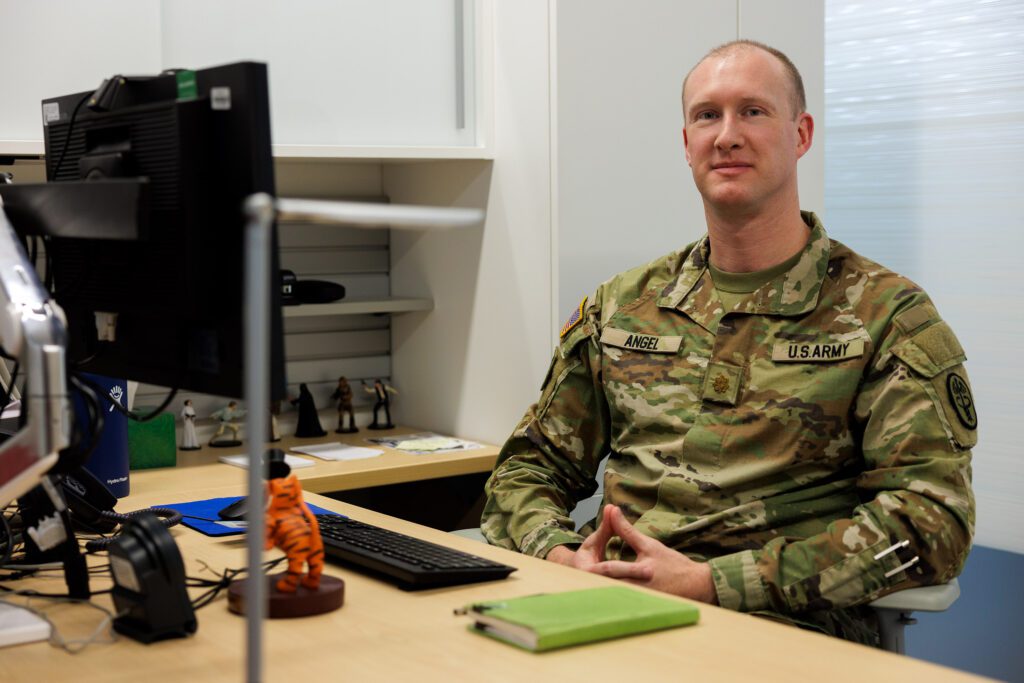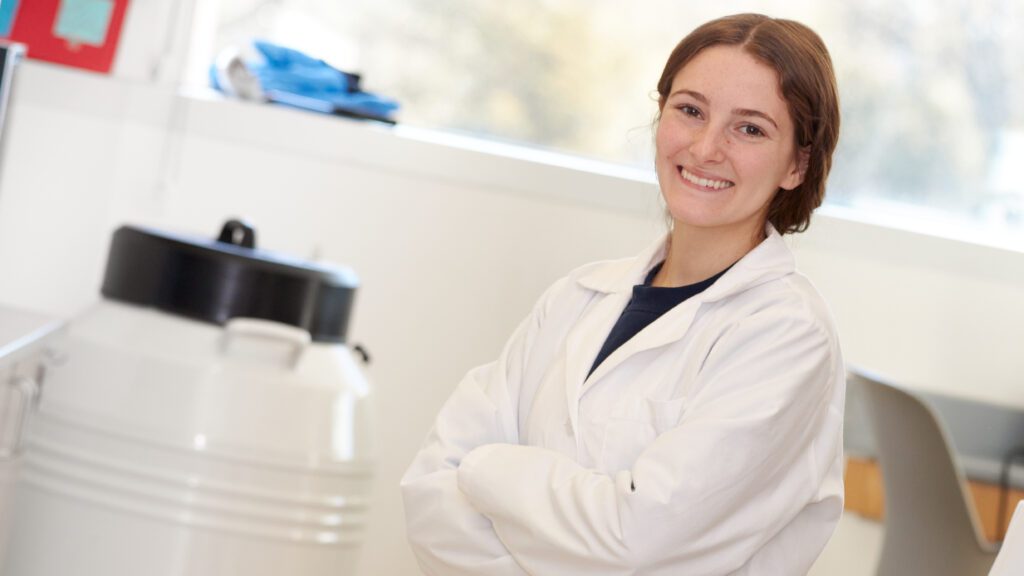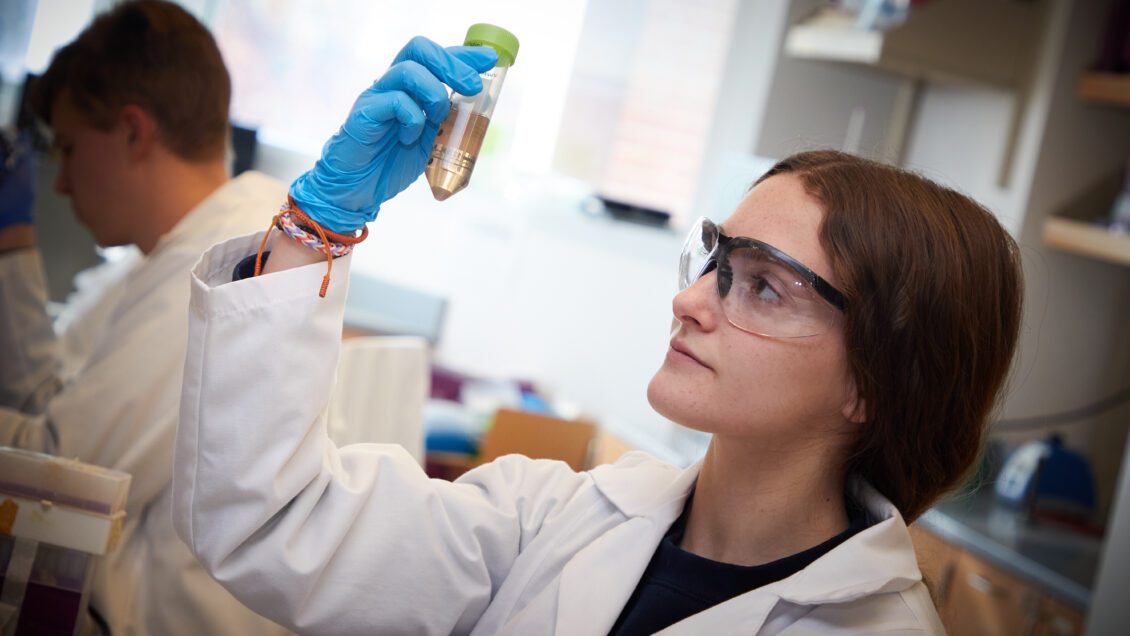Emily Bernabe and Matthew Angel worked in neighboring labs at Clemson University’s Eukaryotic Pathogens Innovation Center (EPIC) a few years ago, sharing lab equipment and sitting next to each other in meetings.
Angel, a career Army officer, was a member of Cheryl Ingram-Smith’s lab and earned his Ph.D. in biochemistry and molecular biology in 2022. Currently, he leads a team of scientists at the Defense Centers for Public Health – Aberdeen at Aberdeen Proving Ground, Maryland, to develop and use molecular biology methods to advance public health initiatives.
Bernabe, a junior majoring in biochemistry and minoring in microbiology, started working in Kerry Smith’s lab the summer before she started at Clemson through the EUREKA! program.
Both Bernabe and Angel were members of the Biochemistry and Genetics Club.
Chance encounter
But it was a chance encounter in Washington, D.C., in fall 2022 that led to Bernabe’s working in Angel’s lab through an Oak Ridge Institute of Science Education (ORISE) internship. ORISE is a program designed to provide practical scientific training experiences for students who are pursuing a degree or have recently graduated.
Bernabe was on a field trip to tour the National Institutes of Health with the Biochemistry and Genetics Club during the 2022 fall break. Angel, who had previously served as president of the organization, met club members in Bethesda, Maryland, for dinner. Bernabe and Angel didn’t know the other would be there.

Angel described to the students how his lab develops wastewater surveillance methods to detect the presence and prevalence of infectious diseases. Clemson was one of the first universities in the United States to monitor wastewater for SARS-CoV-2, starting just a few weeks into the pandemic. The surveillance helped serve as an early warning when the virus was surging. But wastewater can be used to monitor other infectious diseases as well, including influenza, respiratory syncytial virus (RSV), and other respiratory and gastrointestinal illnesses.
Advancing public health
“One of our goals is to give public health officials a better picture of what pathogens are actually in a population. Typical sources of medical data often miss asymptomatic persons or those who are symptomatic but don’t go to the doctor, while wastewater technology has the potential to capture all of this information while maintaining individual privacy.” Angel said. “We’re about developing methods using new and existing technologies to advance the field of public health.”
He told students to let him know if they wanted to work in his lab. Bernabe jumped at the chance.
She spent last summer in Maryland learning the how the lab analyzes samples of untreated wastewater to detect the presence of viruses and bacteria. She also designed an experiment to compare the capabilities of two polymerase chain reaction (PCR) instruments used to detect the viruses and bacteria. In addition, she was able to work with technicians who are trying to develop a method to detect the presence of antimicrobial resistance (AMR) genes in wastewater. Antibiotic resistant bacteria are a growing problem across the United States.
“I thought it was really interesting to learn about a whole other career field that was out there. A lot of people only know about academia and industry careers. Working in the government and seeing that side of things is really interesting,” Bernabe said.

Career choice
Angel, who also earned his bachelor’s degrees from Clemson in 2010, said it seems like working in industry or a government lab is a distant third in student career choice to graduate school or professional training such as medical school, primarily because students don’t know of the opportunities that exist. For students who choose to go into medicine, public health has taken a back seat to clinical institutions, he said.
“To be honest, public health might not be as glamorous as saving lives in an ER. I don’t think there’s been a TV show about public health workers, but there’s plenty of shows like ‘General Hospital’, ‘Grey’s Anatomy’ and ‘Chicago Med,’” he said. “But we’ve come to realize that public health matters and infectious diseases can’t see the uniform you wear. When it comes to infectious disease, there’s no line between military and civilians. That’s why the military is so invested in public health.”
The internship is a way for students like Bernabe to find out if they’re interested in working in a government lab while they also continue to advance their scientific knowledge and skills.
Continuing research
Although Bernabe has returned to Clemson, she’s still working with Angel’s lab on a project to set up a wastewater surveillance program for the U.S. military in the Republic of Korea. Bernabe is going through literature from the South Korean equivalent of the U.S. Centers for Disease Control and Prevention to identify up to a dozen likely targets for the testing.
She’s also researching literature on antimicrobial resistance.
“Reviewing what’s been done in your field is absolutely essential for a scientist. Putting your own research into context and learning to evaluate sources and pick apart somebody else’s research is important,” Angel said. “Emily is learning how to do that, and it’s been a big benefit to our lab because our folks can spend more time on the bench.”
Angel continued, “She’s designing some experiments and learning how to do that in a very detailed manner, which allows her to explain every single step and why she’s doing it. I think that’s going to put her ahead of her peers.”
Bernabe, who wants to pursue a Ph.D. and then conduct infectious disease research, said the internship has introduced her to new technology and methods and provided an opportunity to gain exposure to this type of work.
Angel said he hopes to continue to offer Clemson students opportunities to work in his lab in the future.
Get in touch and we will connect you with the author or another expert.
Or email us at news@clemson.edu

